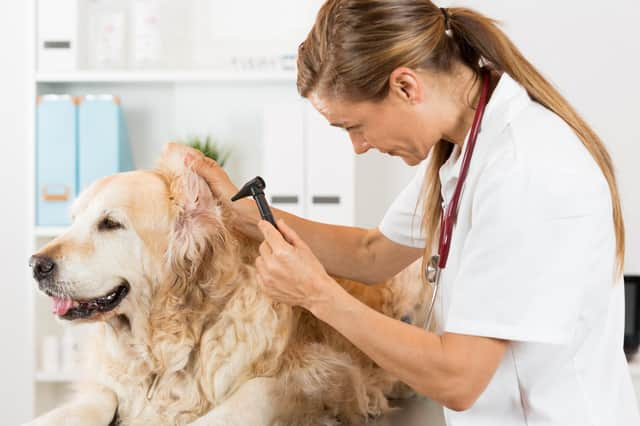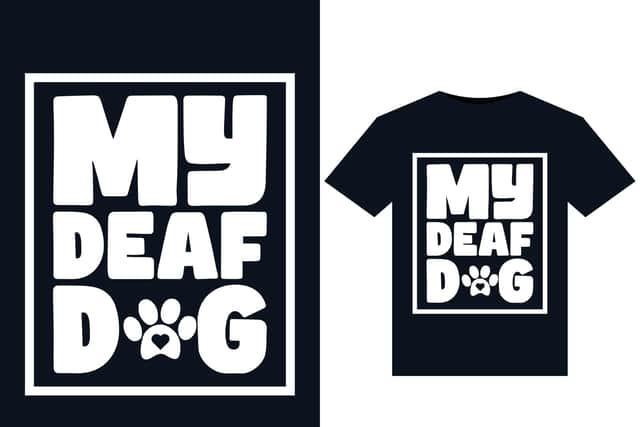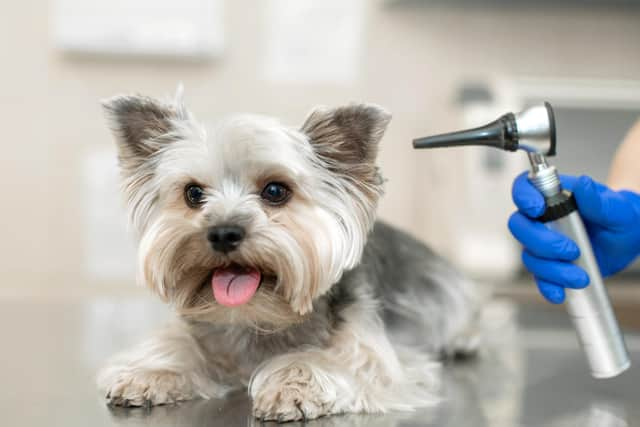PDSA advice on giving best care for deaf pet


Vet staff at leading charity PDSA are highlighting the importance of recognising that our pets’ delicate ears are often susceptible to problems, which, if left untreated, can result in long-term issues and even deafness.
PDSA vet Nurse, Nina Downing, said: “Loss of hearing can be a worrying experience for pets (and their owners), but fortunately, with the right support they can continue to live a happy and healthy life.
How can my pet become deaf?
Advertisement
Hide AdAdvertisement
Hide Ad

“Most ear problems in our pets are easily treated, but occasionally, they can lead to long-term issues and potentially, deafness.
“Deafness can result from a variety of things, such as a serious ear infections, inherited deafness, foreign bodies or trauma. While ear problems are common in both cats and dogs, some breeds can be more likely to suffer with ear infections due to their heavy, hairy flapped ears, their head shape or the amount of hair inside their ears.
Signs to look out for
“There are signs that your pet could be having ear troubles - they may shake, scratch or rub their head more frequently, suffer from red, swollen and itchy ears, or have a build-up of wax and in extreme cases pus. The root cause of an ear infection can be anything from a bacterial or yeast growth, an allergy, foreign body such as a grass seed, injury or even a parasite such as ear mites.


“If caught in time, many ear infections can be easily treated by your vet. While less common, some pets can suffer with chronic ear infections, which can cause long-term problems and may result in surgery in worst cases, which can have the knock-on effect of hearing loss.
Caring for your deaf pet
Advertisement
Hide AdAdvertisement
Hide Ad“Some pets may naturally become deaf with old age, but there are many ways we can support them continue to live a happy, healthy life as their needs change:
Deaf pets won’t hear you approaching as they used to, so take care not to startle them. Always warn friends and family that your pet can’t hear, advise them to only approach your pet from the front so they can see them coming.
Deaf pets are likely to feel vulnerable, as they can’t rely on all of their senses, so make sure that your pet is given the opportunity to approach you and visitors first, rather than the other way around.
Be careful, never startle your pet or disturb them when they are sleeping, as this can make them feel anxious and will prevent them from relaxing completely when resting. Whenever you leave the house, it’s a good idea to ensure your pet can see you leaving, to alleviate panic when they can’t find you.” (photos: Adobe)
Advertisement
Hide AdAdvertisement
Hide AdLooking after your pet with PDSA
Dear PDSA vet, my cat Olive has recently been diagnosed as deaf by our vet. How can I best look after her with her new condition? Thanks, Sally
Hi Sally, Olive can live comfortably with hearing loss but you will need to be patient while she learns her new ways of communication. Deaf pets often feel vulnerable, as they can’t rely on their hearing. Make sure Olive is given the opportunity to approach you and visitors first, rather than the other way around, so she isn’t worried. Similarly, be careful to never startle her or disturb her when she is sleeping, as this can prevent her from relaxing completely when resting. Whenever leaving the house, make sure Olive can see you leaving whenever possible, so she doesn’t panic when she can’t find you. There are training techniques, such as hand signals, which can help you communicate with Olive, too.
Dear PDSA vet, I’ve seen the weather forecast warn snow might be coming to the UK in the next couple of weeks. Should I still walk my dog, Brucey, if it snows? Thanks, Sarah
Hi Sarah, most dogs still love the chance to go out on adventures even on snowy or icy days. Always be extra careful and watch your step on walks as icy surfaces can be just as slippery for our pets. Look out for the salt and grit that is used on roads, as that can irritate our pet’s paws. If you end up walking on salt and grit, be sure to wash Brucey’s paws when you get home.
Advertisement
Hide AdAdvertisement
Hide AdIf Brucey has thin fur, is a lightweight breed, elderly or very young, he may appreciate a coat to keep him warm. Be careful not to be out too long, to prevent him getting too cold.
Dear PDSA vet, my friend’s dog got stung by a bee last year and was really poorly so I’m petrified of the same thing happening to my dog, Ellie, as we get closer to the spring and summer months. What should I do if this does happen? Thanks, Jayne
Hi Jayne, insect stings are fairly common in pets, but most don’t cause a big problem. In extreme reactions cases can be severe and even life threatening, so you’re right to want to be prepared.
If you think Ellie has been stung by an insect, watch for rapid swelling of the lips, neck, eyes, ears and face, as well as breathing difficulties, if you see these signs, you’ll need to take her to the vet immediately. Find out more by visiting the pdsa.org.uk/pet-help-and-advice/pet-health-hub/other-veterinary-advice/first-aid-for-allergic-reactions-and-insect-stings website. If Ellie is having mild reaction such as a skin rash, drooling, limping or mild swelling elsewhere on the body, call your vet for advice, as she might need medication such as an anti-histamine.